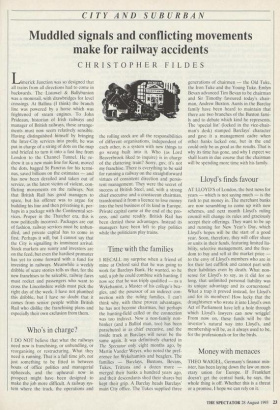Time with the families
I RECALL my surprise when a friend of mine at Oxford said that he was going to work for Barclays Bank. He wanted, so he said, a job he could combine with hunting. I now see that he was triply qualified — as a Wykehamist, a Master of his college's bea- gles, and the posessor of an indirect con- nection with the ruling families. I can't think why, with these proven advantages, he has not become chairman, but perhaps the hunting-field called or the connection was too indirect. Now a non-family non- banker (and a Balliol man, too) has been parachuted in as chief executive, and the inside track at Barclays will never be the same again. It was definitively charted in The Spectator only eight months ago, by Martin Vander Weyer, who noted the pref- erence for Wykehamists and beaglers. The families — Barclays, Buxtons, Bevans, Tukes, Trittons and a dozen more — merged their banks a hundred years ago, and their descendants shed their shares but kept their grip. A Barclay heads Barclays' main City office. The Tukes supplied three
generations of chairmen — the Old Tuke, the Iron Tuke and the Young Tuke. Emlyn Bevan advanced Tim Bevan to be chairman and Sir Timothy favoured today's chair- man, Andrew Buxton. Aunts in the Barclay family have been heard to maintain that there are two branches of the Buxton fami- ly and to debate which kind he represents. The 'special list' (locked in the vice-chair- man's desk) stamped Barclays' character and gave it a management cadre when other banks lacked one, but in the end could only be as good as the results. That is why its time has gone, and why I expect we shall learn in due course that the chairman will be spending more time with his family.


















































 Previous page
Previous page